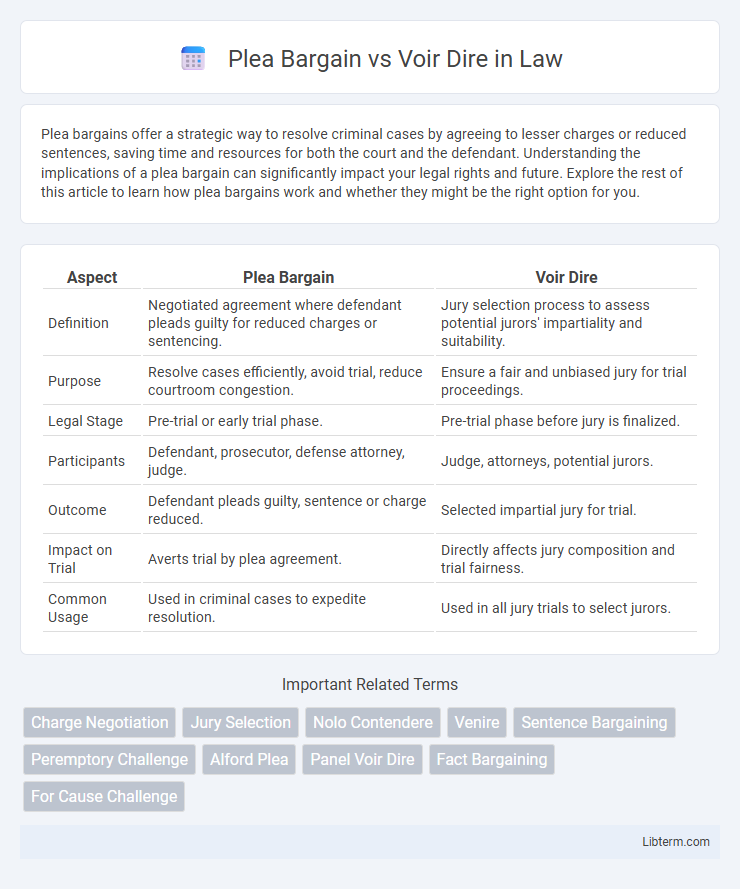Plea bargains offer a strategic way to resolve criminal cases by agreeing to lesser charges or reduced sentences, saving time and resources for both the court and the defendant. Understanding the implications of a plea bargain can significantly impact your legal rights and future. Explore the rest of this article to learn how plea bargains work and whether they might be the right option for you.
Table of Comparison
| Aspect | Plea Bargain | Voir Dire |
|---|---|---|
| Definition | Negotiated agreement where defendant pleads guilty for reduced charges or sentencing. | Jury selection process to assess potential jurors' impartiality and suitability. |
| Purpose | Resolve cases efficiently, avoid trial, reduce courtroom congestion. | Ensure a fair and unbiased jury for trial proceedings. |
| Legal Stage | Pre-trial or early trial phase. | Pre-trial phase before jury is finalized. |
| Participants | Defendant, prosecutor, defense attorney, judge. | Judge, attorneys, potential jurors. |
| Outcome | Defendant pleads guilty, sentence or charge reduced. | Selected impartial jury for trial. |
| Impact on Trial | Averts trial by plea agreement. | Directly affects jury composition and trial fairness. |
| Common Usage | Used in criminal cases to expedite resolution. | Used in all jury trials to select jurors. |
Introduction to Plea Bargain and Voir Dire
Plea bargain refers to a legal negotiation where the defendant agrees to plead guilty to a lesser charge or receive a reduced sentence in exchange for waiving the right to a trial. Voir dire is the process of jury selection in which attorneys and the judge question prospective jurors to identify any biases or inability to serve impartially. Understanding plea bargaining and voir dire is essential for navigating the criminal justice system effectively, as they directly impact the trial's conduct and outcome.
Definition of Plea Bargain
A plea bargain is a legal agreement in which a defendant agrees to plead guilty to a lesser charge or receive a reduced sentence in exchange for waiving the right to a trial. This process helps reduce court caseloads and provides a faster resolution for both prosecution and defense. Unlike voir dire, which is the jury selection process aimed at ensuring impartiality, a plea bargain directly affects the case outcome without going to trial.
Definition of Voir Dire
Voir dire is the jury selection process where attorneys and judges question potential jurors to identify biases and ensure impartiality in a trial. This procedure helps to create a fair jury by weeding out candidates who may have preconceived notions regarding the case. In contrast, a plea bargain is a negotiation between the defendant and prosecutor to settle a case without going to trial.
Key Differences Between Plea Bargain and Voir Dire
Plea bargain involves negotiating an agreement between the defendant and prosecutor to resolve a criminal case without trial, often leading to reduced charges or sentences. Voir dire is the jury selection process where attorneys and judges screen potential jurors for biases to ensure impartiality during the trial. The key differences lie in their purpose: plea bargaining seeks case resolution, while voir dire ensures fair jury composition before the trial begins.
Legal Process: Plea Bargain Explained
A plea bargain is a legal process where the defendant agrees to plead guilty to a lesser charge or receive a reduced sentence, expediting case resolution and avoiding a full trial. This negotiation involves the defendant, prosecutor, and sometimes the judge to reach a mutually acceptable agreement. Unlike voir dire, which focuses on juror selection, a plea bargain aims to streamline the judicial system by resolving disputes efficiently before trial.
Legal Process: Voir Dire Explained
Voir dire is a crucial legal process used during jury selection to assess potential jurors' biases and suitability for a fair trial. It involves attorneys questioning candidates to identify prejudices that could affect impartiality, ensuring an unbiased jury composition. This procedure contrasts with plea bargaining, which resolves cases without a trial by negotiating the defendant's guilty plea for reduced charges or sentencing.
Advantages and Disadvantages of Plea Bargain
Plea bargaining offers the advantage of resolving cases quickly, reducing court backlog, and securing a guaranteed conviction, which benefits both the prosecution and defense. However, it can lead to potential disadvantages such as the risk of innocent defendants pleading guilty due to pressure, diminished transparency in justice, and limited public scrutiny compared to the voir dire process. Unlike voir dire, which emphasizes jury selection to ensure impartiality, plea bargains streamline case outcomes but may compromise thorough fact-finding and trial rights.
Advantages and Disadvantages of Voir Dire
Voir Dire enables attorneys to assess potential jurors' biases, increasing the likelihood of an impartial jury and enhancing the fairness of the trial. Its disadvantages include the considerable time consumption and added complexity, which can delay court proceedings and increase litigation costs. This process also risks exposing trial strategies to the opposing side, potentially undermining case advantage.
Impact on Trial Outcomes and Justice
Plea bargains significantly reduce trial caseloads, often resulting in quicker resolutions but potentially compromising defendants' rights by encouraging guilty pleas regardless of actual guilt. Voir dire plays a critical role in ensuring an impartial jury, directly impacting trial fairness and the accuracy of verdicts by filtering out biased jurors. Together, these processes influence the justice system's balance between efficiency and safeguarding defendants' constitutional protections.
Plea Bargain vs Voir Dire: Which is More Influential?
Plea bargain and voir dire significantly influence criminal justice outcomes, but plea bargains directly determine case resolution by prompting defendants to accept guilty pleas in exchange for reduced sentences, expediting court processes. Voir dire, the jury selection stage, indirectly affects trial outcomes by shaping impartial jury pools, but its influence is limited to trial proceedings that are often bypassed through plea deals. Statistical data shows over 90% of criminal cases are resolved via plea bargains, highlighting their more substantial impact on judicial efficiency and defendant sentencing compared to the more procedural role of voir dire.
Plea Bargain Infographic

 libterm.com
libterm.com